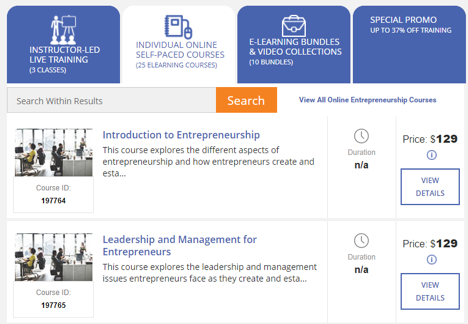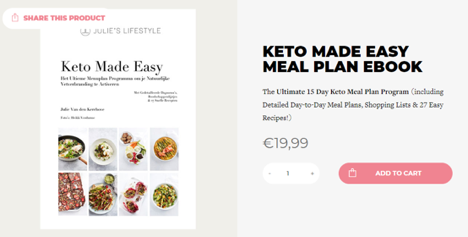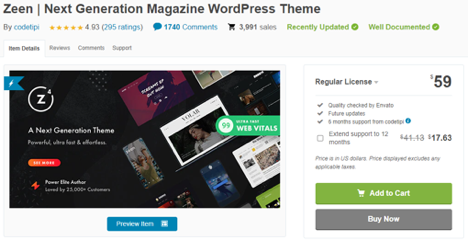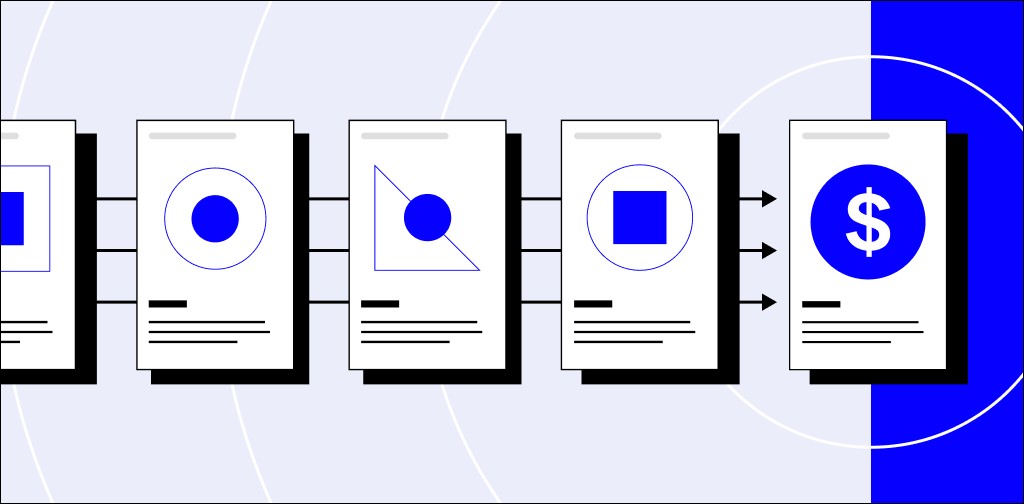The internet gives you access to an extremely large audience. If you’re savvy, you can use that access to earn revenue selling various digital products. This, however, might seem easier said than done, especially when you don’t know what it is you can sell.
The good news is you probably don’t have to look far out of your own comfort zone to come up with digital products to sell online.
The great benefit of a digital product is that you create it once and then sell it infinitely. They’re also cheaper to produce than physical products, and they don’t take up space.
In 2020, more than 2 billion people across the world purchased products and services online, spending over 4 trillion dollars. It’s expected that the number will exceed six trillion in 2024, so the time of trying to start something on your own couldn’t be better.
You already have a unique skill set and know-how to offer to the world, but you just need to understand how to monetize. We’ve listed out 20 digital products that might spark the idea that gets you to create an ecommerce website.
What is a digital product?
A digital product is a product that you can sell online that doesn’t have a physical or tangible form. Basically, digital products are goods you can exchange without touching. A hardcover you buy at your local bookstore is a physical product, while and eBook you download is a digital product.
Why sell digital products?
According to Statista, ecommerce accounted for 5.8 trillion dollars of sales in 2023 and that number is only expected to increase as time goes on. The barrier to entry for ecommerce is relatively low. You probably already know a lot more about how to create digital products than you think. By honing your skills in marketing an ecommerce site, you can sell your digital product and get a piece of that gigantic pie.
Sell digital products online, worry-free
Get started with secure WordPress hosting from Liquid Web
What are the best digital products to sell?
Here are some of the top digital products to sell:
- Online courses
- Tutorials
- Memberships
- eBooks
- Templates
- Recipes
- Photography
- Stock videos
- Music
- Stock audio
- Website themes
- Software
- Mobile apps
- Podcasts
- Meditation audio
- Graphic designs
- Patterns and prints
- Articles and blogs
- Guides and checklists
- Digital services
We’ll discuss what makes each of these digital products a good option to sell in the next section.
20 digital products to sell: inspiration and ideas
You may want to break into ecommerce and sell digital goods, but you find yourself a little stumped on what to offer. Take a look at these digital products to get a better idea of what you could sell online.
1. Online courses

Online courses continue to be one of the hottest digital products to sell for several reasons.
First, demand for online courses never seems to fade. In fact, with more people spending more time at home, and less time commuting, there could be more demand than ever before. People are constantly looking to hone their skills, or even learn new ones as they look to move up in the world in one way or another.
The second big reason online courses are so big involves the potential for passive income. You can create a relatively evergreen course and keep reaping the benefits of people buying it as time passes on.
For example, those who create courses as a passive income stream in the US can typically expect to earn $5,000-$25,000 per year.
To get started, you can use an LMS tool that integrates with your site to help you create and sell your courses with ease.
Pros of selling online courses
- Scalability: Online courses can be sold to an unlimited number of students without the need for physical space or resources.
- Flexibility: Sellers have the flexibility to create courses on a wide range of topics and update content easily.
- Reach: Online courses have a global reach, allowing access to a broader audience beyond geographical limitations.
Cons of selling online courses
- Competition: There is significant competition in the online course market, making it challenging to stand out and attract students.
- Technical challenges: Creating and managing online courses requires technical skills and resources, including video production, website management, and marketing.
- Customer support: Providing adequate customer support for online courses can be time-consuming and may require additional resources.
2. Tutorials
Not too far removed from online courses, tutorials can potentially be an excellent digital product you can sell. People constantly try to figure out how to get things done by themselves. Think of all the times you’ve typed in a web search query starting with “how to.”
You might run into a problem of there being an overabundance over free tutorials on the web. However, you can counter that by going into more depth than the average tutorial on your chosen subject. Or you might be able to package a string of tutorials together that come close to resembling an entire online course.
Pros of selling tutorials
- Potential for depth: You can offer in-depth knowledge and specialized insights beyond what's available in free tutorials.
- Flexibility: Tutorials allow for flexibility in content creation and can cater to niche topics or specific audience needs.
- Recurring income: Generating a steady income stream by offering a subscription service to receive exclusive content on a monthly basis.
Cons of selling tutorials
- Competition from free content: There's abundant free content available online, which may reduce demand for paid tutorials.
- Value perception: Customers may question the value of paid tutorials when similar information is freely accessible.
- Limited scope: Selling individual tutorials may limit revenue potential compared to offering full courses or memberships.
3. Memberships
Much like with courses and tutorials, a membership-based site can offer a built-in source of continuing revenue. You can lock in members by leveraging your expertise to give them new content on a regular basis, or even by facilitating a community based around a certain subject matter.
Pros of selling memberships
- Recurring revenue: Memberships offer a steady stream of income through subscription fees.
- Community building: Memberships foster a sense of belonging and community among subscribers.
- Customer loyalty: Memberships can increase customer loyalty and engagement through exclusive content and perks.
Cons of selling memberships
- Continuous value delivery: Maintaining member satisfaction requires consistently delivering valuable content and benefits.
- Churn rate: Membership businesses may experience high churn rates if subscribers don't perceive ongoing value.
- Initial growth challenges: Acquiring initial members can be challenging, requiring strong marketing efforts and incentives.
4. eBooks

You could write an eBook, put it on the market, and keep making money off it without having to write it again. When looking for the subject matter for your eBook, just think about the areas in your life that you already have expert-level knowledge in; you might be surprised to find that you have a vast amount of valuable experience and know-how to expound upon.
Keep in mind that eBooks run the risk of becoming outdated after a time, so it may be worth updating them every so often with more current information and insights.
Pros of selling eBooks
- Low production costs: Creating and distributing eBooks typically incurs minimal production costs compared to printed books.
- Wide reach: eBooks can reach a global audience through digital distribution platforms, expanding market potential.
- Passive income: Once published, eBooks can generate passive income as long as they remain available for purchase.
Cons of selling eBooks
- Market saturation: The eBook market is saturated, making it challenging to stand out among competitors.
- Piracy: eBooks are susceptible to piracy, leading to potential revenue loss.
- Format limitations: Some readers prefer physical books or have compatibility issues with eBook formats, limiting potential sales.
5. Templates
There is a very wide array of templates you can create to sell. So many people are always looking for ways to make life just a bit easier. Oftentimes, a template can provide just the ease they seek. All they have to do is essentially fill in the blanks.
Some examples of popular templates:
- Resumes
- Cover letters
- Business planning
- PowerPoint
- Spreadsheets/Excel
- Design (web, graphics, etc.)
Like with many other digital products to sell, this has a great potential for passive income.
Pros of selling templates
- Passive income: Templates can generate passive income as they can be sold repeatedly without additional effort.
- Scalability: Templates can be replicated and sold to a large customer base, offering scalability.
- Time-saving: Templates save customers time by providing pre-designed solutions for common tasks or projects.
Cons of selling templates
- Market saturation: The market for templates may be saturated, making it challenging to differentiate products.
- Customization limitations: Some customers may require customization beyond what the templates offer, leading to potential dissatisfaction.
- Intellectual property concerns: Templates may be susceptible to copyright infringement or misuse, requiring proper legal protection.
6. Recipes
People love to eat. That’s not changing any time soon.
There’s certainly no shortage of recipes online, but oftentimes it can be hard to know who those recipes are coming from, and they can feel pretty generic. You can sell your recipes online on a private member’s site, or in a digital eBook, by adding your own personal flair. You’ll, of course, especially have a heads up if you are a chef or professionally trained cook.
Pros of selling recipes online
- Low overhead costs: Selling recipes online typically involves minimal overhead costs.
- Global reach: Recipes can reach a worldwide audience, maximizing market potential.
- Creative freedom: Sellers have the freedom to create and sell recipes on various platforms, showcasing their culinary expertise.
Cons of selling recipes online
- Free competition: There's abundant free recipe content available online, making it challenging to compete.
- Difficulty in monetization: Customers may expect recipes to be free or be hesitant to pay for individual recipes, so you may need to build a membership program.
- Copyright concerns: Recipes may be easily copied or shared without proper attribution or compensation, posing intellectual property challenges.
7. Photography

Photography seems to never stop growing as a hobby. You can take that hobby and start making money from it. There are several ways you can sell digital photography online. One of the main ways is by selling stock photography.
With all the countless publishing websites on the internet, there is extremely high demand for stock photos to help add visual elements to the articles, blog posts, landing pages, and more being posted every minute of every day.
Pros of selling photography online
- Global reach: Photography can reach a worldwide audience through online platforms, expanding market potential.
- Portfolio building: Selling photography online can serve as a platform for building a diverse and impressive portfolio, attracting potential clients for commissioned work.
- Exposure opportunities: Successful sales of photography online can lead to exposure opportunities, such as features in magazines, websites, or galleries, enhancing the photographer's visibility and reputation.
Cons of selling photography online
- Legal complexity: Selling photography online may involve navigating complex legal issues related to copyright, licensing agreements, model releases, and usage rights, requiring legal expertise and diligence.
- Image theft risks: Photos sold online are susceptible to theft or unauthorized use, posing risks to the photographer's intellectual property rights and potential revenue loss.
- Market fluctuations: The demand for certain types of photography may fluctuate based on trends, seasons, or economic conditions, leading to unpredictable income streams and challenges in maintaining financial stability.
8. Stock videos
While we are on the subject of stock imagery, you can also consider selling stock video online.
Content creators are crafting new videos more than ever and often need stock video to supplement shots they might not be able to easily take. You can take your fancy drone set up and film some stunning landscapes and skyline views and sell those clips on various marketplaces or directly on your website.
Pros of selling stock videos
- Passive income: Stock videos can generate passive income through licensing fees and royalties.
- Scalability: Once uploaded to stock video platforms, videos can be sold to multiple customers without additional effort.
- Global reach: Stock videos have a global audience, increasing the potential for sales and revenue.
Cons of selling stock videos
- Market saturation: The market for stock videos is highly saturated, making it challenging to stand out.
- Pricing pressure: Pricing for stock videos can be competitive, leading to downward pressure on earnings.
- Quality requirements: Stock video platforms often have stringent quality standards, requiring high-quality footage to be accepted for sale.
9. Music
Again, content creators are using video and audio mediums all the time and they love to feature engaging music that will not get them in copyright infringement problems. You might not be aware that stock music is a niche, but it certainly is. Use your musical talents to create this highly coveted digital product.
Pros of selling music online
- Discovery opportunities: Online platforms provide opportunities for musicians to be discovered by new audiences through algorithms, playlists, and recommendations.
- Direct fan interaction: Musicians can directly interact with their fans through social media, live streams, and digital platforms, fostering a closer connection.
- Data insights: Online distribution platforms offer data analytics and insights into listener demographics, preferences, and behaviors, which can inform marketing strategies and content creation.
Cons of selling music online
- Revenue share: Digital distribution platforms often take a percentage of sales or streaming revenue, reducing earnings for artists.
- Piracy: Music is susceptible to piracy and unauthorized distribution, leading to potential revenue loss and copyright infringement issues.
- Digital fragmentation: The music industry's digital landscape is fragmented, with various platforms, streaming services, and social media channels, making it challenging to manage and optimize presence across all channels.
10. Stock audio
Perhaps, you aren’t exactly musical, but you do have a strong grasp on recording sound. Invest in some audio equipment and record stock sounds that content creators can use in their audio and video content. Background noises, sound effects, and nature sounds are examples of popular stock audio.
Pros of selling stock audio
- Versatility: Stock audio can be used in a wide range of projects, including films, advertisements, podcasts, and video games, increasing its market potential.
- Repurposing opportunities: Musicians and composers can repurpose existing tracks or unused compositions as stock audio, maximizing the value of their work.
- Passive income: Once uploaded to stock audio platforms, tracks can generate passive income through licensing fees and royalties over time.
Cons of selling stock audio
- Licensing complexity: Stock audio licensing can be complex, with different usage rights and terms depending on the platform and type of project, requiring careful management and understanding.
- Price competition: The stock audio market is competitive, with pricing pressure from other sellers and low-cost options, potentially affecting earnings.
- Quality standards: Stock audio platforms often have strict quality standards, requiring tracks to meet certain criteria for acceptance, which may involve additional time and effort in production and editing.
11. Website themes

This one is kind of an offshoot of templates. Essentially, you can create themes as a digital product to sell that remove a bulk of the work involved in building a website. Your theme will have the basic structure and design built right into it. Anybody can take your theme and insert in their own content.
For example, you could create and sell some of the best Woocommerce themes available on the web to help other brands get their ecommerce stores off the ground.
Pros of selling website themes
- Customization potential: Website themes offer flexibility and customization options, allowing users to tailor the design to their specific needs and preferences.
- Market demand: With the increasing demand for online presence, there is a growing market for website themes, providing ample opportunities for sales and revenue.
- Recurring sales: Website themes can generate recurring sales as users may purchase multiple themes for different projects or updates over time.
Cons of selling website themes
- Technical support: Selling website themes may require providing ongoing technical support to customers for installation, troubleshooting, and updates, which can be time-consuming.
- Design originality: Standing out in the competitive market for website themes requires offering unique designs and features, which can be challenging to maintain.
- Platform dependency: Relying on specific platforms or marketplaces for selling website themes can pose risks if those platforms change their policies, algorithms, or fee structures.
12. Software
As we step into some of the more technical digital products to sell, we’ll start off with software. If you are a developer, you don’t necessarily have to make the next gigantic program to earn revenue from your work. Consider identifying a niche you’re familiar with and building software that helps solve common problems within it.
Pros of selling software
- Scalability: Software products can be easily replicated and distributed to a large customer base, offering scalability and potential for significant revenue growth.
- Innovation opportunities: Selling software allows for continuous innovation and updates, providing opportunities to introduce new features and improvements to attract customers.
- Subscription models: Subscription-based pricing models for software products can provide a steady stream of recurring revenue, offering stability and predictability for the business.
Cons of selling software
- Development costs: Developing and maintaining software products and increasing their SDLC can be expensive, requiring investments in technology, infrastructure, and talent.
- Piracy and copyright infringement: Software products are vulnerable to piracy and unauthorized use, leading to potential revenue loss and intellectual property concerns.
- Technical support: Providing adequate customer support for software products, including troubleshooting, updates, and maintenance, can be resource-intensive and requires skilled personnel.
13. Mobile apps
Gone are the days when desktop traffic dominated the internet. Mobile is king and while the cliché that “there’s an app for that” seems truer now than ever before, the fact remains that there is still plenty of room in the mobile world for even more apps. Again, with competition being so fierce, try to identify a niche and build your app to serve its specific audience.
Pros of selling a mobile app
- Brand building: Successful mobile apps can contribute to brand recognition and credibility, enhancing the overall brand image and reputation.
- Data insights: Mobile apps can provide valuable user data and analytics, offering insights into user behavior, preferences, and trends that can inform business decisions and strategies.
- Offline access: Some mobile apps offer offline functionality, allowing users to access content or features without an internet connection, enhancing user experience and convenience.
Cons of selling a mobile app
- User acquisition costs: Acquiring users for mobile apps can be expensive, especially through paid advertising or app store optimization (ASO) strategies, impacting overall profitability.
- Regulatory compliance: Selling apps may require compliance with various regulations and legal requirements, such as data privacy laws (e.g., GDPR, CCPA), which can involve additional costs and complexities.
- Platform restrictions: App stores impose strict guidelines and policies on app submissions, updates, and monetization methods, limiting flexibility and autonomy for app developers.
14. Podcasts
Podcasts are typically associated with being free, with any revenue typically coming from ad support. However, it’s not entirely unheard of to sell podcasts. Business-related and industry-specific podcasts featuring industry experts can serve as a sort of masterclass and tend to do better as digital products for sale than a standard lifestyle podcast.
Pros of selling podcasts
- Revenue potential: Selling podcasts can generate revenue through subscriptions, sponsorships, advertising, or premium content offerings, providing multiple monetization opportunities.
- Targeted audience: Podcasts allow for niche content creation, attracting a dedicated audience interested in specific topics or themes, leading to higher engagement and loyalty.
- Brand building: Successful podcasts can enhance brand visibility, credibility, and authority in their respective industries or niches, contributing to overall brand growth and recognition.
Cons of selling podcasts
- Competitive market: The podcasting landscape is highly competitive, with millions of podcasts available, making it challenging for new podcasts to gain traction and attract listeners.
- Production costs: Producing high-quality podcasts requires investments in equipment, hosting services, editing software, and potentially hiring talent or staff, leading to significant upfront and ongoing costs.
- Monetization challenges: Selling podcasts may face challenges in converting listeners into paying subscribers or securing lucrative sponsorships, especially for niche or lesser-known podcasts, impacting revenue potential.
15. Meditation audio

The benefits of meditation and mindfulness practices are becoming more commonly accepted these days. Productivity, mood, and overall health can be enhanced through meditation. If you are entrenched in the world of life coaching and wellness, you can create audio recordings of guided meditations and sell them a la carte or in packages.
Pros of selling meditation audios
- Growing demand: There is a growing demand for meditation audio content as more people seek relaxation, stress relief, and mindfulness practices.
- Diverse audience: Meditation audio can appeal to a diverse audience, including individuals seeking mental health support, spiritual growth, or personal development.
- Subscription models: Meditation audio can be monetized through subscription-based models, providing recurring revenue and stability for the business.
Cons of selling meditation audios
- Competition: The market for meditation audio is becoming increasingly competitive, with many free and paid options available, making it challenging to stand out.
- Quality expectations: Consumers expect high-quality production and content in meditation audio, requiring investments in equipment, editing, and potentially hiring professional narrators or instructors.
- Monetization limitations: Monetizing meditation audio may face challenges as consumers may expect such content to be freely available or may be hesitant to pay for individual tracks or subscriptions.
16. Graphic designs
Unlike good fresh food at a popular restaurant, graphic design does not have to be created to order. You can make graphic designs to sell to people who need visual elements in things like websites, presentations, marketing materials, brandings, videos, and more. If you’re feeling ambitious, you can even create whole packages of graphic design to sell your work in bulk.
Pros of selling graphic designs
- Skill enhancement: Selling graphic designs provides an opportunity for designers to continually enhance their skills and stay updated with industry trends.
- Portfolio building: Graphic designers can use sales as a way to build their portfolio and showcase their work to potential clients or employers.
- Collaboration opportunities: Selling graphic designs may lead to collaboration opportunities with other artists, designers, or businesses, expanding networks and creative possibilities.
Cons of selling graphic designs
- Time investment: Creating and selling graphic designs can be time-consuming, requiring significant effort in concept development, creation, and promotion.
- Client management: Dealing with clients, negotiations, and revisions can be challenging and time-consuming for graphic designers selling their work independently.
- Revenue variability: Income from selling graphic designs may fluctuate, depending on market demand, competition, and the success of marketing efforts, leading to financial uncertainty.
17. Patterns and prints
Just because you’re selling products in digital formats doesn’t mean they can’t become physical. If you’re in the crafting world, you can sell patterns that customers can use for knitting, sewing, and more.
You can also sell printable artwork that can become posters, framed pictures, greetings cards, and more. Even 3D-printable products are in demand.
Pros of selling digital patterns and prints
- Creative outlet: Selling digital patterns and prints provides designers with a creative outlet to express their artistic vision and explore new ideas.
- Flexible working hours: Designers have the flexibility to work on their own schedule, allowing for a better work-life balance and autonomy in managing time.
- Community engagement: Selling digital patterns and prints can foster connections and engagement within creative communities, providing opportunities for collaboration, feedback, and support.
Cons of selling digital patterns and prints
- Customer service demands: Dealing with customer inquiries, support requests, and order fulfillment can be time-consuming and require excellent communication and organizational skills.
- Seasonal fluctuations: Sales of digital patterns and prints may experience seasonal fluctuations, with demand varying throughout the year based on holidays, trends, and seasonal themes.
- Tech challenges: Managing digital files, website maintenance, and staying updated with technology trends can pose technical challenges for designers, requiring ongoing learning and adaptation.
18. Articles and blogs
As stated earlier, there is a plethora of online publishers out on the web, and they are always on the lookout for more articles and blogs to publish. If you are a writer, you might tend to wait for an assignment to write, but you can also write articles on spec and put them up for sale on either your own website or one of several writing marketplaces. Alternatively, you can monetize your blog through subscriptions, affiliate links, and more.
Pros of selling article and blog content
- Thought leadership: Selling articles and blogs can establish writers as thought leaders in their respective fields, enhancing their credibility and authority.
- Networking opportunities: Writing for clients or publications can provide networking opportunities, connecting writers with industry professionals, potential collaborators, and new clients.
- Skill development: Selling articles and blogs offers writers the chance to continually hone their writing skills, explore diverse topics, and adapt to different writing styles and formats.
Cons of selling article and blog content
- Content devaluation: The market for articles and blogs is saturated, with many low-cost options available, potentially devaluing the content and affecting earnings.
- Client dependence: Relying on client orders for article and blog sales can lead to income instability, as clients may change their needs or priorities.
- Intellectual property concerns: Writers may face challenges with copyright infringement or unauthorized use of their work, requiring vigilant protection and enforcement.
19. Guides and checklists
Between hobbies and businesses, there are plenty of people out there wanting to start something new. While they might not need you to hold their hand during the process, they’d likely appreciate a guiding light along the way. Use your expertise to craft checklists and or guides that your customers can use to help them ensure that they remain focused and on the right path as they venture out to new pastures.
Pros of selling guides and checklists
- Valuable resources: Guides and checklists provide valuable information and tools that can help customers achieve specific goals or solve problems efficiently.
- Customization potential: Sellers can offer customizable guides and checklists tailored to different industries, niches, or individual needs, increasing their appeal and value.
- Passive income: Once created, guides and checklists can generate passive income through sales, downloads, or subscriptions, providing a steady stream of revenue over time.
Cons of selling guides and checklists
- Free alternatives: Customers may find similar guides and checklists available for free online, reducing the perceived value and willingness to pay for premium versions.
- Content quality: Maintaining high-quality and up-to-date content in guides and checklists requires ongoing effort and updates, which can be time-consuming and resource-intensive.
- Market saturation: The market for guides and checklists is competitive, with many options available, making it challenging for sellers to stand out and attract customers.
20. Services

This is definitely not in the same passive income category as practically all of the other items on our list, but you can sell your services online to perform remotely/virtually. Some examples of digital services you can offer include:
- Writing
- Editing
- Proofreading
- Transcribing
- Translating
- Tutoring
- SEO
Pros of selling digital services
- Specialization opportunities: Selling digital services allows providers to specialize in niche areas, becoming experts in specific industries or types of services, which can lead to higher demand and premium pricing.
- Relationship building: Digital service providers have the opportunity to build long-term relationships with clients, fostering trust, loyalty, and repeat business through excellent service and communication.
- Remote work: Selling digital services enables providers to work remotely from anywhere with an internet connection, offering flexibility and freedom in choosing their work environment and lifestyle.
Cons of selling digital services
- Pricing pressure: Competition in the digital services market can lead to pricing pressure, with clients expecting lower prices or seeking out cheaper alternatives, potentially affecting profitability.
- Scope creep: Managing client expectations and project scope can be challenging, as clients may request additional services or changes beyond the initial agreement, leading to scope creep and potential disputes.
- Dependency on technology: Digital service providers are dependent on technology and internet connectivity for delivering services, making them vulnerable to technical issues, outages, and security threats that can disrupt operations and affect client satisfaction.
What you need to start selling
How do you sell digital products? Before starting, consider the product itself, marketing strategy, and the website.
Decide which digital products to sell
Digital products have woven themselves into different parts of our daily lives. Here are some of the categories of the most profitable digital products:
- Art
- Music
- Data
- Newsletters
- Online courses
- Membership sites
- Coaching and consulting
- eBooks
- Templates
Choose what platform to sell your digital products on
There are different platforms where you can sell your digital products.
- WooCommerce — A free WordPress plugin and one of the best ecommerce platforms in the world. It’s excellent for selling both physical and digital products.
- Magento — Excellent and one of the most popular ecommerce development platforms. It’s not limited to selling physical products only but digital and downloadable services and products too.
- Podia — A widely popular ecommerce platform for selling digital products, such as webinars, courses, downloads, membership subscriptions, etc.
- LearnDash — A good option for selling online courses.
- MemberPress — A WordPress membership plugin where you can sell digital products and paid memberships without sharing a cut of your products.
Create a marketing strategy to promote your digital products
A digital marketing strategy is a general plan that outlines how you’ll achieve the marketing goals of your business via online channels. It’s mostly going to summarize which digital marketing tactics and channels you’ll use, plus how much you’ll invest.
Some examples include:
- Social media campaigns: You can, for instance, aim for partnerships with influencers or paid ads intended for your target audience
- Content marketing strategy: This is an approach focused on creating and sharing relevant, consistent, and helpful content that attracts a clearly defined audience and provides them with valuable information.
- Growth marketing strategy: Traditional marketing might include things like an online ad or a TV commercial. Growth marketing, on the other hand, focuses on the whole customer funnel, not just the top of it. They constantly experiment within a toolkit of growth tactics, such as affiliate marketing, SEO (search engine optimization), PPC (pay-per-click) ads, email marketing, etc.
How to effectively sell digital products
How do you make money selling digital products? There are multiple elements you need to consider here.
Identify a problem your product needs to solve
If you’re not sure which products you want to focus your time, money, and effort on, put all your ideas on paper, evaluate them, and carefully think about the issue they can solve. For instance, if you want to teach people how to get fit at home without using any equipment, you would be helping them to:
- Increase their confidence.
- Get healthier.
- Save money and time they'd usually spend on a personal trainer or a gym.
The thing is, the more important and painful the issue your digital product wants to solve, the better you’ll be at creating and selling digital products.
Conduct product feasibility studies
A feasibility study considers different factors, including technical, economic, legal, and scheduling, to help you determine if your plan will succeed.
As part of such a study, project managers must check if they have enough financial resources, people to perform the job, and the appropriate technology. Also, they can get familiar with potential issues that could arise along the way and prepare solutions.
Check forums and Facebook groups
You can start your own or explore existing forum topics, Facebook groups, and other online places where your target audience is. These are all types of digital communities where people share helpful information, useful tips, and generally the same passions as you do.
Learn about your target market
To sell digital products, you have to know who your customers are. That doesn’t mean everyone who buys your services or products would fit the same profile. However, analyzing your core customer base — or, in other words, target market — can help you understand your buyers better as well as figure out their motivations and needs.
Demographics like gender, age, occupation, education level, and family situation can also help you determine what your target audience needs, and what they’re willing to spend their money on.
Set the pricing strategy
Pricing strategy is the approach businesses take to determine what the cost of their digital services and products should be. There is no pricing strategy that fits everyone on the market the same, but there are elements that can help you set your own.
Competition
Before you start selling digital products, check out your competitors’ prices. If your price ends up being too low compared to your competition, you can easily devalue your project and lead your potential buyers to believe the quality isn’t as good. Pricing your products higher, on the other hand, shows them you bring something more to the table. Don’t be afraid to stand out in the crowd, but also think about things that make your offer different from your competitors.
Value
The most important thing about your digital product is to provide a user with value. For instance, offer a software plugin that is vital to someone’s online store that provides immense value to a customer, such as a payment gateway. They literally wouldn’t be able to run a store without making payments on their site.
Fees and expenses
The excitement of making your first sale can quickly fade when you put all your costs on paper. When setting prices for your products, think long-term. Analyze your pricing strategy all the time. Someday, as your website grows and your offer levels up, you’ll likely have to raise your prices due to higher expenses too.
Types of pricing
Think about what type of pricing makes the most sense. Is it better for you to opt for a subscription/recurring fee or make it a one-time purchase for your customers?
Analyze your competitors
It’s important to identify your competition. Your competitor is a business with a similar product and targets the same market segments as you do. There are three types of competitors:
- Direct competition: They offer the same services and products to the same clients within the same territory as you do.
- Indirect (secondary) competition: Their offer is just slightly different than yours, or they target a different audience within the same territory.
- Substitute competition: They offer different products to the same customers in the same territory.
To create a unique offer and really stand out, you need to find out who your competitors are, and what value they are bringing to the market.
Gather information about your competition
For example, you can focus on information about their:
- Products/services. Evaluate their offer and compare them to what you have. Purchase their products and try them out. What are the pros and cons? What do you think about the quality? Does it respond to users’ needs and preferences?
- Branding. Visit your competitors at trade shows and follow them on social media to understand their unique selling proposition (USP) better. USP is the factor that makes your business stand out compared to the competitors. Analyze their websites, brochures, product documents, and catalogs.
- Reputation in the market. Talk to clients, distributors, and suppliers to get their perspectives. What are their opinions about the marketing strategies, products, and customer service of your competitors?
Bottom line
As you’ve seen in our list, there are plenty of avenues you can take if you’re looking to get into selling digital products. We’ve barely even scratched the surface.
When deciding what digital products to sell or thinking up other ideas for your online business, consider the skills you already have. Chances are, you can use what you already know to create and sell products that people will want to buy.
Start selling digital products today
Once you hone in on that perfect digital product, take a look at our guide to starting your ecommerce business to help as you get ready to launch.
We can also help you with your website.
It's easy to get started with a WordPress ecommerce store. We’ll get you set up with a professional ecommerce platform that's fully managed, so you can focus on growing your business.
Find out why over 500,000 sites and stores host with Liquid Web.
Check out our plans to get started today.
This blog was originally published in March 2022. It has since been updated for accuracy and comprehensiveness.

